Eggplant supports heart health, blood sugar balance, and overall wellness due to its rich fiber and antioxidant content.
Low in calories yet high in nutrients, this versatile vegetable—also known as aubergine—contains powerful compounds like nasunin and chlorogenic acid that help protect cells from oxidative stress. Regularly including eggplant in your meals may support digestion, metabolism, and cardiovascular health.
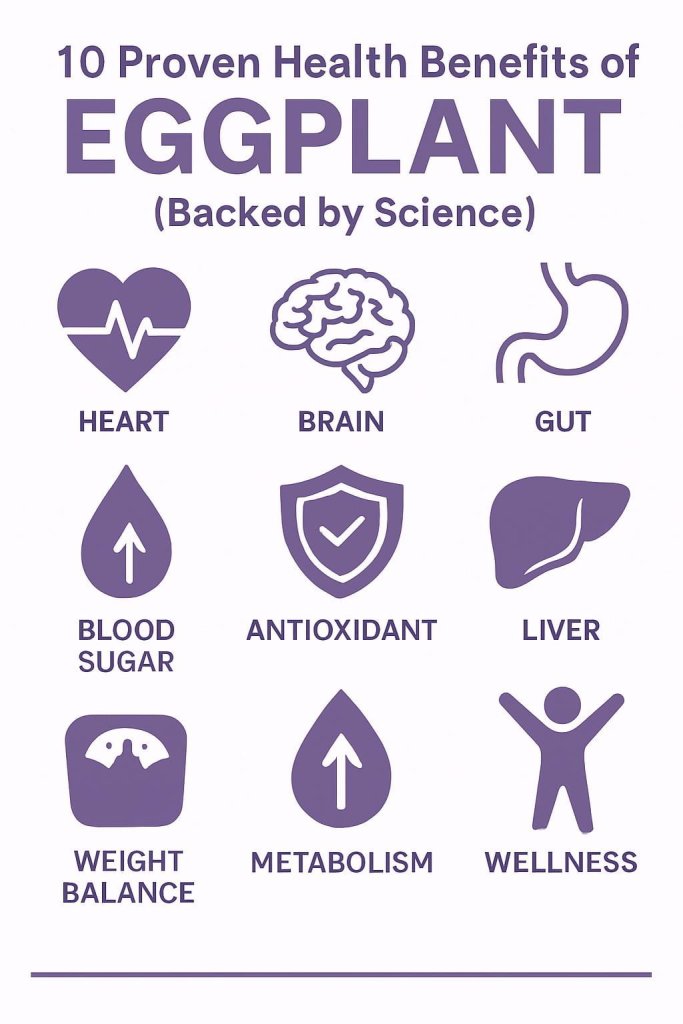
What Is Eggplant? (Overview and Nutrition Profile)
Eggplant (Solanum melongena) is a nutrient-dense, fiber-rich vegetable belonging to the nightshade family (Solanaceae) — the same plant family as tomatoes, potatoes, and peppers. It is widely known as aubergine in Europe and brinjal in South Asia.
Native to Asia and cultivated for over 1,500 years, eggplant is now a staple in Mediterranean, Middle Eastern, and Asian cuisines. Its spongy texture and mild flavor make it highly versatile — perfect for grilling, roasting, or blending into dips like baba ghanoush.
Beyond its culinary use, eggplant is recognized for its impressive nutrient and antioxidant content, including anthocyanins, chlorogenic acid, and various vitamins and minerals that support metabolic and cardiovascular health.

Nutrition Profile of Eggplant (per 1 cup cooked ≈ 82 g)
Eggplant is a low-calorie, nutrient-rich vegetable that provides dietary fiber, vitamins, minerals, and powerful plant compounds that support overall health. It fits easily into balanced diets focused on heart health, digestion, and metabolic wellness.
According to the U.S. Department of Agriculture (USDA) FoodData Central – Eggplant, Cooked (2024), one cup (about 82 g) of cooked eggplant contains the following nutrients:
| Nutrient | Amount | % Daily Value (DV) |
|---|---|---|
| Calories | 35 kcal | — |
| Carbohydrates | 8.6 g | — |
| Fiber | 2.5 g | 9 % |
| Protein | 0.8 g | — |
| Fat | 0.2 g | — |
| Vitamin B6 | 0.09 mg | 7 % |
| Folate | 18 µg | 5 % |
| Potassium | 188 mg | 4 % |
| Manganese | 0.19 mg | 10 % |
| Copper | 0.07 mg | 8 % |
Source: USDA FoodData Central – Eggplant, Cooked (2024)
Key Phytonutrients:
Nasunin – A potent anthocyanin pigment concentrated in the purple peel. Research shows nasunin helps protect cell membranes from oxidative stress by scavenging free radicals and chelating excess iron — mechanisms that support brain and cardiovascular health.
Chlorogenic Acid – A major polyphenol found in eggplant flesh. It contributes antioxidant and anti-inflammatory activity, supports blood sugar balance, and may aid healthy lipid metabolism.
Solasonine and Solamargine – Naturally occurring glycoalkaloids studied for potential roles in cell membrane stability and metabolic regulation. At typical dietary levels, they are considered safe and may have physiological benefits when eggplant is cooked properly.
Together, these nutrients and phytonutrients make eggplant more than a colorful vegetable — it’s a functional food that supports heart, digestive, and metabolic health when enjoyed regularly as part of a balanced diet.
10 Proven Health Benefits of Eggplant (Backed by Science)
Eggplant is a nutrient-dense vegetable that supports heart, brain, and metabolic health through its fiber, antioxidants, and polyphenols. Regular inclusion in a balanced diet may help improve overall wellness, digestion, and diet quality.
1. Supports Heart Health

Eggplant’s combination of fiber, potassium, vitamin B6, and antioxidants supports cardiovascular wellness. Fiber helps manage cholesterol by lowering LDL (“bad”) levels, while anthocyanins and chlorogenic acid—natural antioxidants found in the skin and flesh—protect blood vessels from oxidative stress.
A 2021 review in Nutrients found that anthocyanin-rich foods may improve blood lipid levels and endothelial function, key factors in heart health.
Additionally, potassium supports heart rhythm and blood pressure regulation by balancing sodium effects, according to the American Heart Association.
Tip: Bake, steam, or grill eggplant instead of frying to preserve nutrients and limit added fat.
Learn more: Harvard T.H. Chan School of Public Health – Vegetables and Heart Health
2. May Aid Blood Sugar Regulation
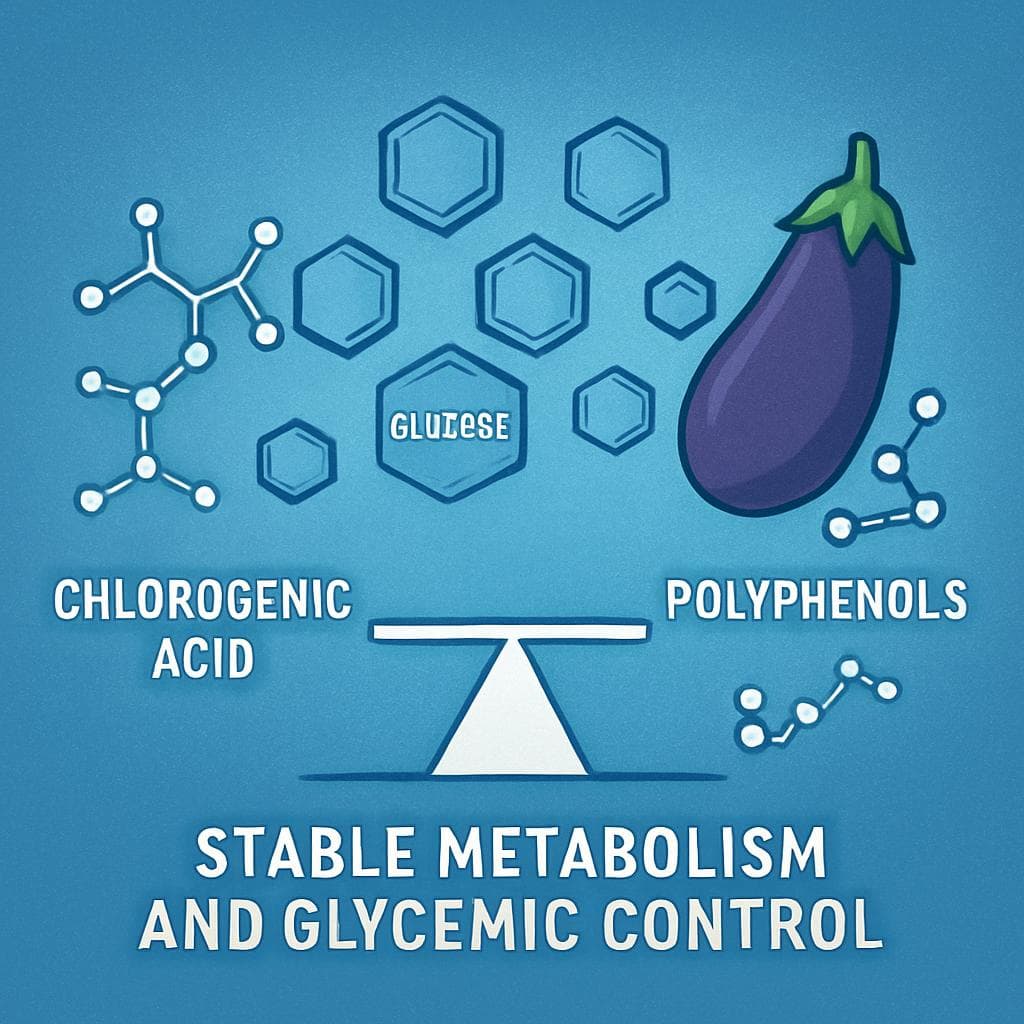
Eggplant’s polyphenols—especially chlorogenic acid and nasunin—may help slow carbohydrate digestion and glucose absorption. These compounds support balanced blood sugar by inhibiting certain enzymes (α-glucosidase and α-amylase) involved in starch breakdown.
A Frontiers in Nutrition (2023) review reported that these plant compounds may also enhance insulin sensitivity and reduce post-meal glucose spikes.
With its low glycemic index and high fiber content, eggplant can be a beneficial choice for individuals aiming to manage blood glucose naturally within a balanced diet.
Learn more: National Institutes of Health – Polyphenols and Metabolic Health
3. Promotes Weight Management

Eggplant is low in calories yet high in fiber, making it ideal for supporting fullness and appetite control. Fiber slows digestion, prolonging satiety and helping prevent overeating.
A Nutrition Research (2022) study showed that fiber-rich diets contribute to better weight management and improved metabolic markers.
One cup of cooked eggplant contains roughly 35 calories, helping you create balanced, lower-calorie meals without sacrificing volume or taste.
Try this: Add roasted or grilled eggplant to salads, wraps, or whole-grain bowls for a satisfying, low-calorie option.
4. Provides Antioxidant Protection
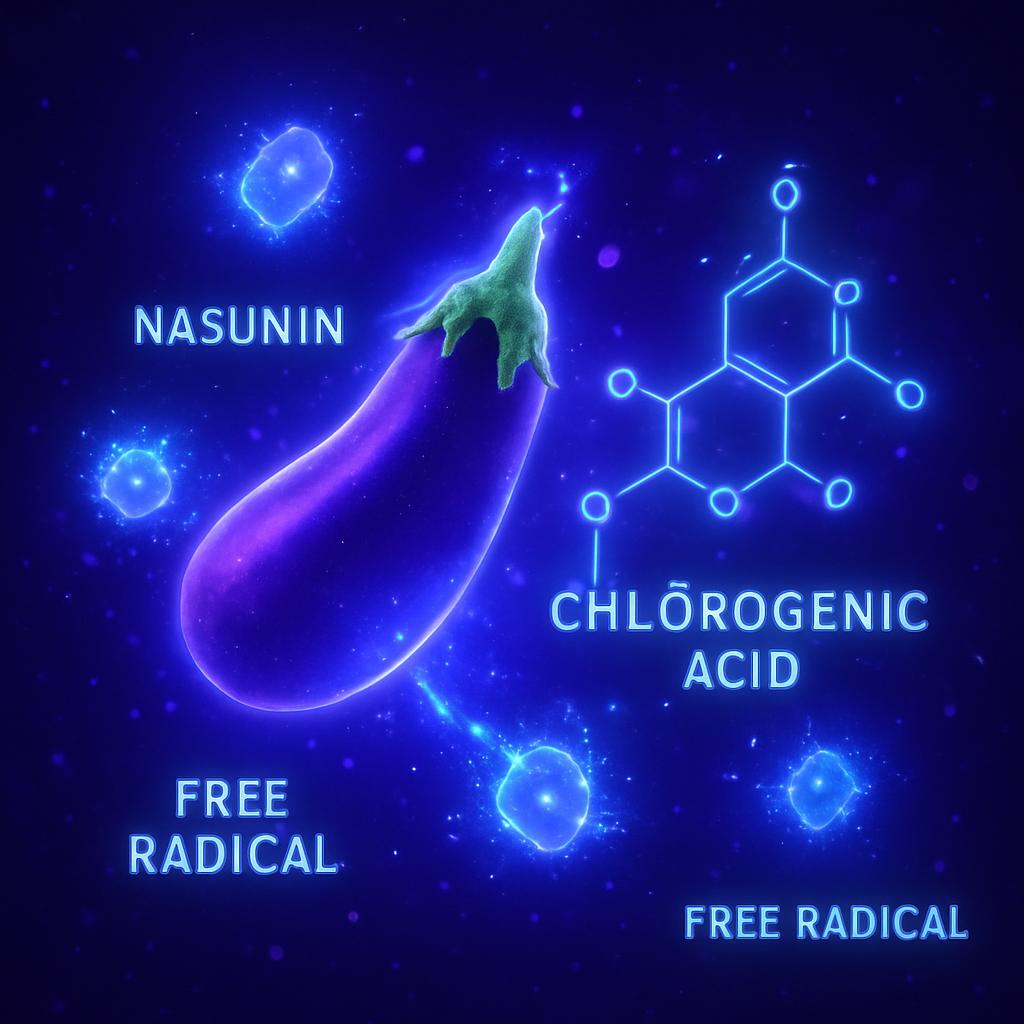
The purple pigment nasunin, found in the eggplant’s peel, is a potent antioxidant that helps neutralize harmful free radicals.
A Journal of Agricultural and Food Chemistry (2021) report found that nasunin protects lipid membranes from oxidative damage, supporting cellular and brain health.
Meanwhile, chlorogenic acid offers additional anti-inflammatory support, helping to maintain metabolic and vascular balance.
Learn more: National Library of Medicine – Chlorogenic Acid Review
5. May Support Brain and Cognitive Function

Eggplant’s anthocyanins—natural pigments that give its peel a deep purple color—may help protect brain cells from oxidative stress, a key factor associated with cognitive decline and aging. These compounds have been studied for their ability to improve memory performance, protect neurons, and reduce inflammation in brain tissue.
A 2024 systematic review published in the National Center for Biotechnology Information (NCBI) found that regular intake of anthocyanin-rich foods may support cognitive performance, neural plasticity, and mood regulation across different age groups. The study concluded that anthocyanins help maintain brain cell integrity by reducing oxidative stress and promoting blood flow to brain regions linked to learning and memory. (NCBI – The Effect of Anthocyanins on Cognition: A Systematic Review)
Including eggplant and other colorful vegetables such as blueberries, red cabbage, and purple sweet potatoes in your daily meals may help support long-term brain health and memory function as part of a balanced diet rich in antioxidants and plant nutrients.
6. Promotes Digestive and Gut Health
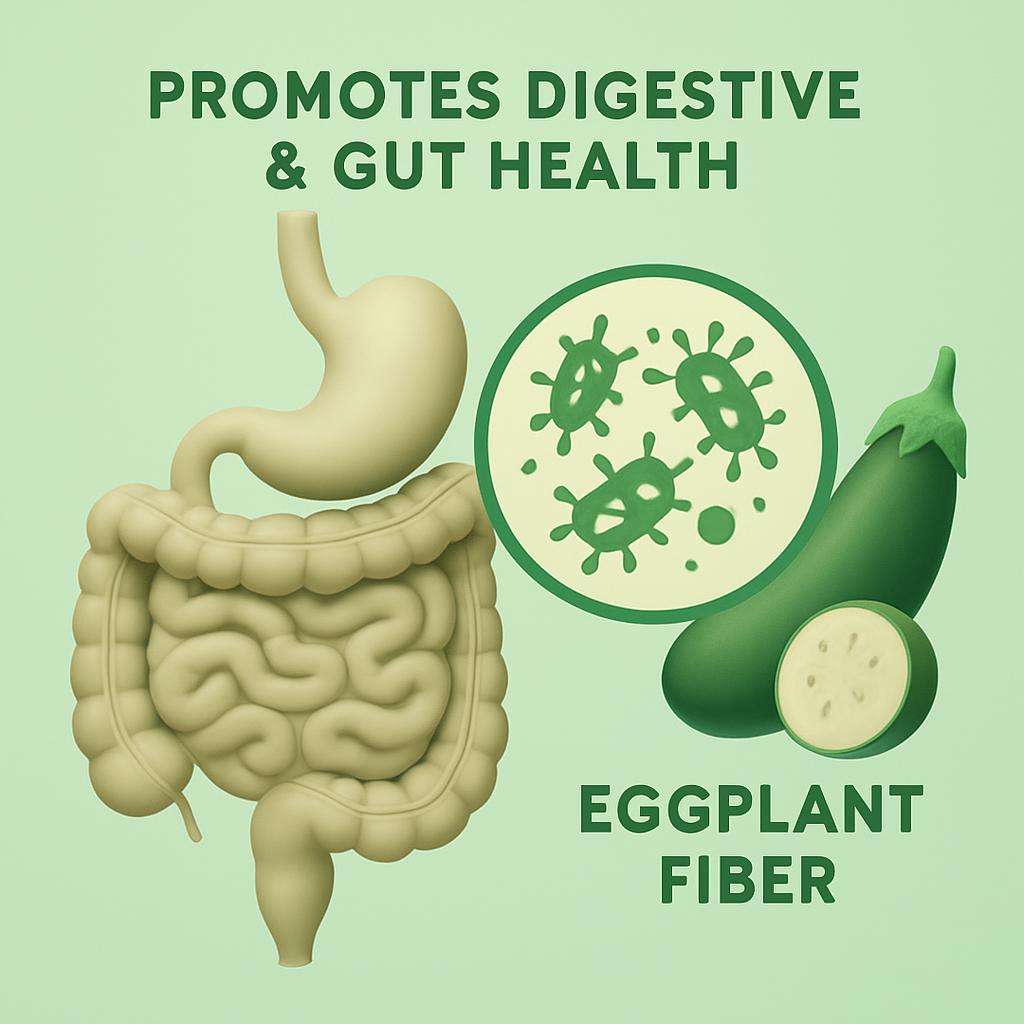
Eggplant is a valuable source of dietary fiber, which supports digestive regularity and promotes a healthy gut microbiome. Fiber acts as a prebiotic, feeding beneficial bacteria in the gut and helping maintain a balanced microbial environment essential for proper digestion and nutrient absorption.
According to the Cleveland Clinic – Gut Microbiome: What It Is and Why It’s Important, a diet rich in plant-based fiber helps keep the digestive system functioning smoothly, supports bowel regularity, and may reduce the risk of constipation and colon-related issues. A strong gut microbiome is also linked to improved immune function and better metabolic health outcomes.
Including eggplant regularly in your diet, alongside other fiber-rich vegetables and fermented probiotic foods like yogurt, kefir, or miso, may help support optimal gut health and digestion naturally.
Tip: Pair roasted or grilled eggplant with probiotic-rich foods for a synergistic, gut-friendly meal combination.
7. Supports Bone and Mineral Health
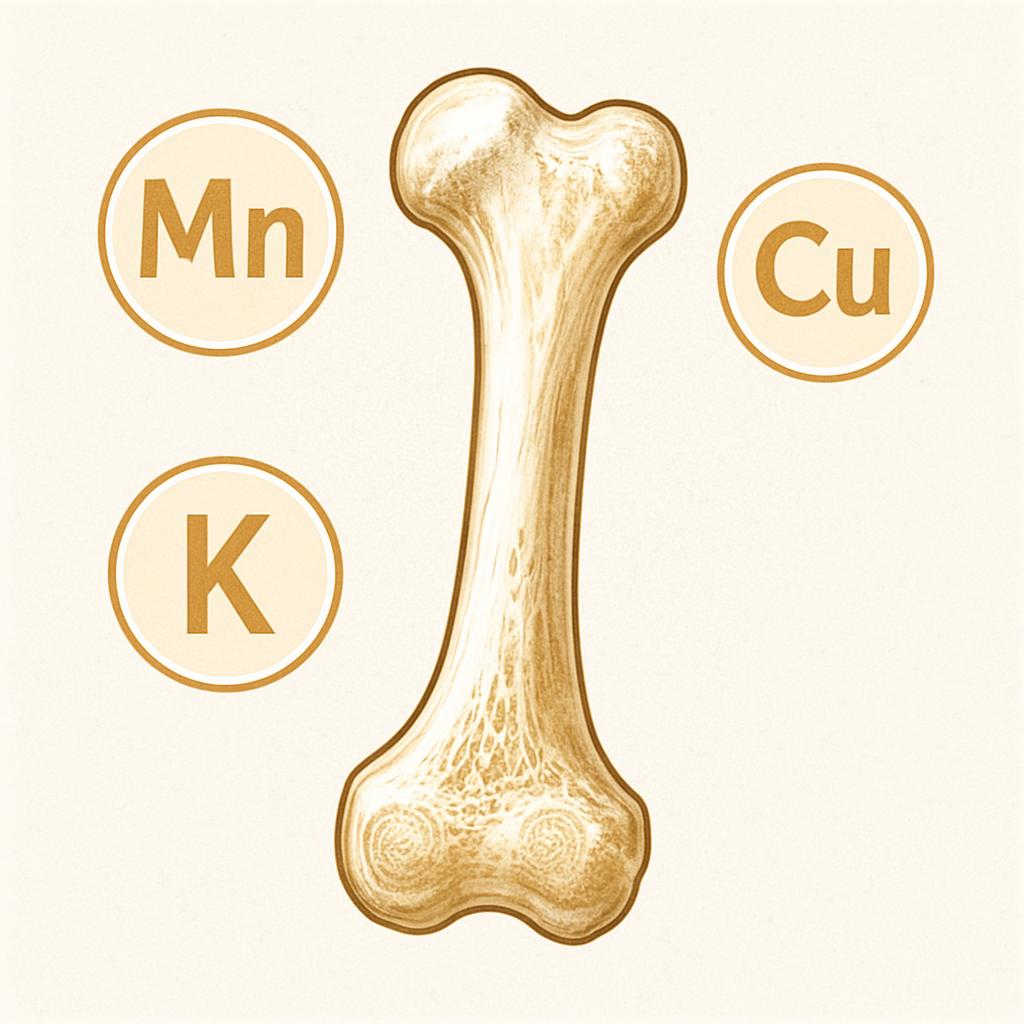
Eggplant provides manganese, copper, and potassium—trace minerals that contribute to bone strength and enzyme function.
A 2022 Food Chemistry study noted that these minerals, combined with eggplant’s antioxidant polyphenols, may help reduce oxidative stress in bone tissue.
While not a major calcium source, eggplant supports overall mineral intake and contributes to skeletal maintenance when consumed as part of a nutrient-diverse diet.
Learn more: NIH Office of Dietary Supplements – Manganese Fact Sheet
8. Helps Maintain Healthy Blood Pressure
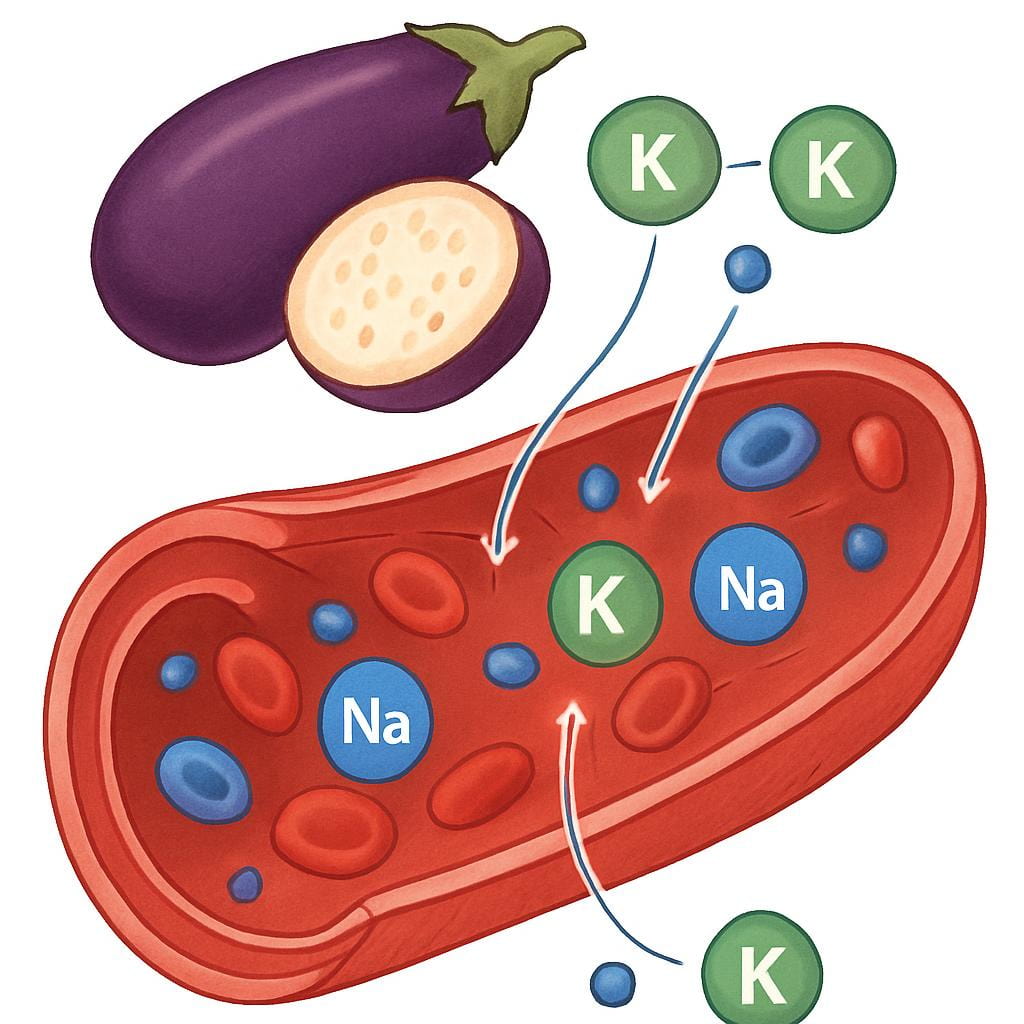
Eggplant’s potassium supports electrolyte balance and fluid regulation, both essential for stable blood pressure.
The American Heart Association highlights potassium’s role in reducing sodium’s impact, relaxing blood vessel walls, and improving circulation.
Additionally, the antioxidants in eggplant may support vascular health and protect arteries from oxidative stress, promoting optimal cardiovascular function.
9. May Support Liver and Metabolic Health

Preclinical studies show that chlorogenic acid and nasunin in eggplant may support liver enzyme balance and reduce oxidative stress.
A Food Science and Biotechnology (2022) analysis reported that eggplant extract helped reduce lipid accumulation and supported metabolic activity in animal models.
While human data remain limited, adding eggplant to a balanced, plant-forward diet supports liver health and natural detoxification processes in the body.
Learn more: National Center for Biotechnology Information – Chlorogenic Acid and Metabolism
10. Boosts Overall Nutrient Intake and Diet Quality

Including eggplant enhances dietary diversity, adding antioxidants, fiber, and minerals to your meals.
The U.S. Department of Agriculture (USDA) recommends filling half your plate with vegetables daily, and eggplant is an easy way to achieve that.
Its versatility allows you to prepare it in multiple ways—grilled, roasted, baked, or blended into dips like baba ghanoush—supporting a nutrient-rich, heart-healthy lifestyle.
How to Eat Eggplant for Best Results
Eggplant is a highly versatile vegetable that fits easily into a balanced diet. For most healthy adults, a serving size of ½–1 cup of cooked eggplant per day provides a good source of fiber, antioxidants, and trace minerals without adding many calories.
Best Cooking Methods
To retain nutrients and limit oil absorption:
- Bake or grill eggplant slices brushed lightly with olive oil and herbs.
- Steam or roast for a tender texture without excess fat.
- Avoid deep-frying, since eggplant’s porous structure easily absorbs oil, increasing calorie content.
Pairing Tips for Better Nutrition
Pairing eggplant with healthy fats like extra-virgin olive oil helps the body absorb its fat-soluble antioxidants, such as nasunin. Combining it with tomatoes or garlic adds complementary compounds like lycopene and allicin, which support cardiovascular and immune health.
Try this: Roast diced eggplant with tomatoes, olive oil, and garlic for a fiber-rich, antioxidant-packed side dish.
Learn more: Harvard T.H. Chan School of Public Health – Vegetables and Healthy Cooking
Possible Side Effects and Precautions
Eggplant is generally safe for most people when eaten in moderate amounts as part of a balanced diet. Because it’s a nightshade (Solanaceae) vegetable, a small number of individuals may experience sensitivities.
| Concern | Details | Guidance / Source |
|---|---|---|
| Allergies or Sensitivities | True allergy is uncommon, but some people report itching, hives, or swelling after eating nightshades (e.g., eggplant, tomatoes, peppers). Evidence that nightshades broadly “cause inflammation” is lacking. | If symptoms occur, stop eating eggplant and consult a clinician. See Cleveland Clinic’s overview on nightshades and sensitivity for context. Cleveland Clinic – Nightshade Vegetables |
| Glycoalkaloids (incl. solanine) | Eggplant naturally contains glycoalkaloids in small amounts. A scientific risk assessment by EFSA (covers aubergine) notes dietary exposure from non-potato nightshades is low, and cooking helps reduce levels. | Choose fresh, undamaged eggplant and cook thoroughly (bake, grill, steam). See EFSA Journal risk assessment. EFSA – Glycoalkaloids in foods (incl. aubergine) |
| Medication considerations | No well-documented, eggplant-specific drug interactions. However, any major diet change (e.g., substantially higher fiber or potassium) can affect people on heart or blood-sugar medications. | If you use medications for diabetes, hypertension, or heart disease, discuss significant diet changes with your healthcare provider. |
| Pregnancy & Breastfeeding | Safe when washed and cooked properly as part of a varied diet. Food safety is the main concern (avoid unwashed produce; cook thoroughly). | Follow Mayo Clinic pregnancy food-safety advice on washing produce; avoid raw/unwashed items. Mayo Clinic – Foods to avoid during pregnancy |
| General produce safety | Proper handling reduces microbial risk. FDA advises washing produce under running water (no soap or detergent) and following basic kitchen hygiene. | Rinse, separate from raw meats, and refrigerate promptly. FDA – Selecting & Serving Produce Safely |
Tip: Always wash eggplant under running water, trim damaged spots, and cook thoroughly (roast, grill, or steam). These steps support food safety and may further reduce residual glycoalkaloids.
Recommended Daily Intake and Storage Tips
Ideal Serving Size
Most adults can enjoy ½–1 cup (80–100 g) of cooked eggplant daily, depending on dietary needs and calorie goals.
Safe Storage Guidelines
- Refrigeration: Store whole, unwashed eggplants in the crisper drawer at ≤ 40 °F (4 °C).
- Shelf Life: Use within 5–7 days for best flavor and nutrition.
- Cut Eggplant: Store in an airtight container and consume within 1–2 days.
- Avoid Freezing: Freezing affects texture and nutrient quality.
Food Safety Tip
Proper washing and handling of fresh vegetables like eggplant are essential to reduce the risk of foodborne illness and preserve nutritional quality. According to the U.S. Food and Drug Administration (FDA) – Selecting and Serving Produce Safely, consumers should always follow safe handling practices for all fresh produce—from shopping to preparation.
FDA-Recommended Safety Practices:
- Rinse under clean running water: Wash whole, uncut eggplant just before eating or cooking. Avoid soap, bleach, or commercial cleaners, as they can leave harmful residues.
- Use clean tools: Wash hands for at least 20 seconds before and after handling produce. Use sanitized cutting boards and utensils to prevent cross-contamination.
- Dry with a clean towel: Gently pat dry with a paper towel or clean cloth to remove lingering bacteria.
- Store safely: Keep eggplant and other fresh vegetables in the refrigerator at ≤ 40 °F (4 °C) and consume within 5–7 days for best freshness and safety.
- Separate from raw meat: Always store and prepare fresh produce away from raw meat, poultry, and seafood to prevent bacterial transfer.
These simple steps, endorsed by the FDA, help ensure that your meals are both nutritious and safe. Practicing consistent produce hygiene supports overall wellness and aligns with national food safety recommendations.
Frequently Asked Questions (FAQ)
1. Is it okay to eat eggplant skin?
Yes. The purple skin contains nasunin, a powerful antioxidant that supports cell health. Wash thoroughly before cooking.
2. Can people with diabetes eat eggplant daily?
Yes. Eggplant is low in carbohydrates and rich in fiber, which may help support balanced blood sugar levels.
3. Does eggplant cause inflammation?
No clear evidence links eggplant to inflammation. In fact, its antioxidants and polyphenols may help reduce oxidative stress.
4. How should eggplant be stored?
Keep it unwashed in a cool, dry place or the refrigerator. Use within 5–7 days for best freshness.
5. Can eggplant help with weight control?
Yes. Its high fiber and low calorie content make it a satisfying addition to balanced, weight-management diets.
6. Is it safe to eat eggplant raw?
It’s best to cook eggplant, as raw flesh can be slightly bitter and may contain small amounts of solanine, which cooking neutralizes.
7. Can eggplant be eaten every day?
Yes, in moderation. Regular consumption supports overall diet quality when combined with other vegetables and whole foods.
Conclusion
Eggplant is a nutrient-rich, low-calorie vegetable that supports heart, digestive, and metabolic health through its fiber, antioxidants, and minerals. Its versatility makes it easy to incorporate into soups, curries, stir-fries, and grilled dishes.
By preparing it properly and combining it with complementary foods like olive oil, garlic, or tomatoes, you can maximize its nutritional potential.
Add eggplant to your meals several times a week to enjoy its health benefits as part of a balanced diet.
This content is for informational purposes only and not medical advice.
References:
- USDA FoodData Central – Eggplant, Cooked (2024)
- National Center for Biotechnology Information (NCBI) – The Effect of Anthocyanins on Cognition: A Systematic Review (2024)
- MDPI – Chlorogenic Acid: Antioxidant and Metabolic Health Review (2022)
- American Heart Association – How Potassium Can Help Control High Blood Pressure
